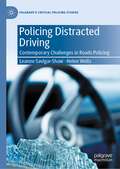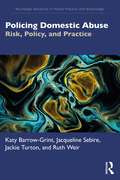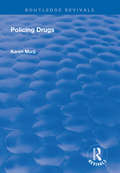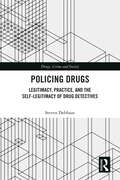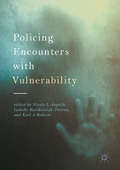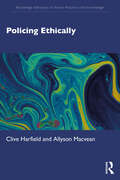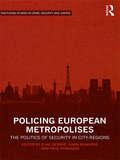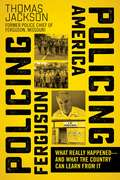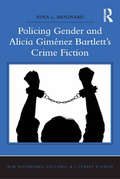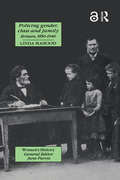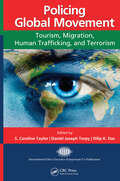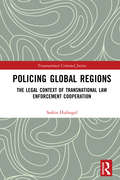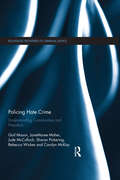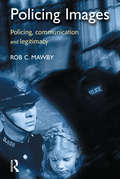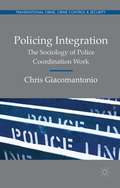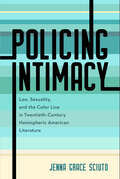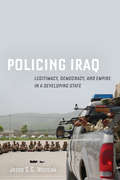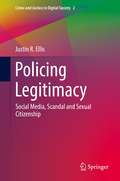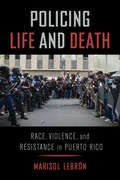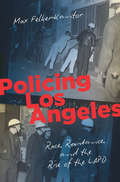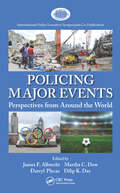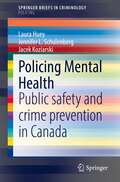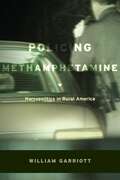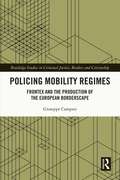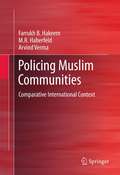- Table View
- List View
Policing Distracted Driving: Contemporary Challenges in Roads Policing (Palgrave's Critical Policing Studies)
by Helen Wells Leanne Savigar-ShawThis book draws on original research and existing theoretical perspectives and frameworks to critically examine the role of roads policing and its place within the wider field of policing. It looks at the challenges and complexities of doing roads policing and experiencing roads policing from the perspectives of police officers and the public. It uses distracted driving, and more specifically mobile phone use, as an evidence-based case study for a common issue to examine the contribution it makes to collisions, and the challenges of policing it as a driver behaviour. It also discusses broader issues such as the role of roads policing, police legitimacy, the interpretation of law, the interpretation of risk and generating compliance with the law. It speaks to both policing scholars and practitioners, as well as policy makers and road safety organisations.
Policing Domestic Abuse: Risk, Policy, and Practice
by Jackie Turton Katy Barrow-Grint Jacqueline Sebire Ruth WeirThis book is dedicated to improving the practice of the policing of domestic abuse. Its objective is to help inform those working in policing about the dynamics of how domestic abuse occurs, how best to respond to and investigate it, and in the longer term how to prevent it. Divided into thematic areas, the book uses recent research findings to update some of the theoretical analysis and to highlight areas of good practice: &‘what works and why&’. An effective investigation and the prosecution of offenders are considered, as well as an evaluation of the success of current treatment options. Policing domestic abuse can only be dealt with through an effective partnership response. The responsibilities of each agency and the statutory processes in place when policy is not adhered to are outlined. Core content includes: A critique of definitions and theoretical approaches to domestic abuse, including coverage of the myths surrounding domestic abuse and their impact on policing. An exploration on the challenges of collecting data on domestic abuse, looking at police data and the role of health and victim support services. A critical review of different forms of abuse, different perpetrators and victims, and risk assessment tools used by the police. A critical examination of the law relating to domestic abuse; how police resources are deployed to respond to and manage it; and best practice in investigation, gathering evidence, and prosecution Key perspectives on preventing domestic abuse, protecting victims, and reducing harm. Written with the student and budding practitioner in mind, this book is filled with case studies, current research, reports, and media examples, as well as a variety of reflective questions and a glossary of key terms, to help shed light on the challenges of policing domestic violence and the links between academic research and best practice.
Policing Drugs (Routledge Revivals)
by Karim MurjiFirst published in 1998, this influential volume develops previous research by the author and explores issues and solutions regarding the roles of law enforcement, drug referral and official and media reactions. Section one analyzes the rationale for drug enforcement and evaluates the strengths and weaknesses of four main approaches. It looks at the pressure on the police to take action in local drugs markets, particularly within a context where the police emphasize their responsiveness to public demands in a more "consumerist" age. Section two examines welfarist policies directed towards drug users and minor drug offenders. Section 3 focuses on the media and coverage of crack-cocaine and ecstasy in the 1990s - particularly where these have been based upon police briefings and reports.
Policing Drugs: Legitimacy, Practice, and the Self-Legitimacy of Drug Detectives (Drugs, Crime and Society)
by Steven DebbautExploring the complex interplay between drug law enforcement and self-legitimacy among police officers, this book, through ten months of ethnographic research in Belgian cities, examines how drug detectives justify their role within a challenging landscape of moral, social, and legal dilemmas.Chapters cover key theoretical frameworks, including self-legitimacy, moral philosophy, and policing culture, alongside detailed interviews and field observations. Readers gain insight into the motivations and ethical conflicts that shape policing practices, revealing how officers navigate societal expectations, the symbolic ‘war on drugs’, and their own sense of moral duty. Its insights into the ‘eradicative’ versus ‘sanitorial’ drug discourse provide valuable perspectives on how enforcement strategies are informed by underlying social and cultural beliefs. By analysing how detectives confront the limits of punitive approaches, this study encourages a re-evaluation of current drug policies and their effectiveness, offering a nuanced view of the realities of drug policing in contemporary society.Policing Drugs: Legitimacy, Practice, and the Self-Legitimacy of Drug Detectives is ideal for scholars, policymakers, and law enforcement professionals interested in criminal justice, drug policy, and police ethics.
Policing Encounters with Vulnerability
by Nicole L Asquith Isabelle Bartkowiak-Théron Karl A RobertsThis edited collection brings together scholars and practitioners to consider the ways in which policing organisations approach vulnerability and the strategies they develop to reduce victims, offenders and police officers’ susceptibility to increased harm. Based on their work with policing services, the public criminologists and critical policing scholars collected together in this edited volume consider vulnerability in terms of people, processes, and institutional practices. While more attention is being paid to some experiences of vulnerability — particularly at the later stages of the criminal justice process — this collection will be the first to focus on the specific issues faced by policing services as the front end of criminal justice. The case studies of vulnerability in each chapter offer the reader new insights into the operational concerns in working with vulnerable people (including vulnerable police officers). This collection is ideally suited for scholars of applied criminal justice studies (including policing studies), police recruits and officers in training, and policing practitioners such as policy and program development officers.
Policing Ethically (Routledge Advances in Police Practice and Knowledge)
by Allyson Macvean Clive HarfieldAt a time when much in UK policing is the subject of intense public and media scrutiny, there prevails a practitioner discourse about policing ethically that is ongoing formally in police ethics committee discussions, and probably informally in station offices, canteens, classrooms, and police vehicles. Since January 2024, these conversations have added emphasis with the publication of the College of Policing’s revised Code of Ethics with which policing practitioners in England and Wales are coming to grips. This book explores thinking about policing ethically for those who have to use and implement the ideas – to those who, when law and policy is silent on the matter before them, nevertheless have to make a justifiable decision and act upon it.Applicable to policing generally, not just to the UK, Part 1 of this book presents conceptual contextualization for thinking about policing ethically. Following which, Part 2 considers practical implications of policing ethically.Some of the key topics that the book covers are as follows:• Discussions of managing power and vulnerability• Implementing frontline ethics in practice• The process of making ethically informed decisions• Considerations around ethics and the use of artificial intelligence by policing practitioners• Prerequisites to ethical leadership• Considering “public interest” in relation to policing ethically• Risk management as a moral obligationDrawing upon the policing practitioner and policymaking experience of the authors, this book will be of interest and use to all those involved in delivering policing: constables of all ranks (student, probationary, and experienced), policing community support officers, professional support staff, policing ethics committee members, and policymakers. The book is also a contribution to the wider academic literature on policing and ethics, and will be of interest not only to policing ethicists and ethnographers but also to students and policymakers in the fields of criminology, sociology, and governance.
Policing European Metropolises: The Politics of Security in City-Regions (Routledge Studies in Crime, Security and Justice)
by Adam Edwards Elke Devroe Paul PonsaersUnderstanding the politics of security in city-regions is increasingly important for the study of contemporary policing. This book argues that national and international governing arrangements are being outflanked by various transnational threats, including the cross-border terrorism of the attacks on Paris in 2015 and Brussels in 2016; trafficking in people, narcotics and armaments; cybercrime; the deregulation of global financial services; and environmental crime. Metropolises are the focal points of the transnational networks through which policing problems are exported and imported across national borders, as they provide much of the demand for illicit markets and are the principal engines generating other policing challenges including political protest and civil unrest. This edited collection examines whether and how governing arrangements rooted in older systems of national sovereignty are adapting to these transnational challenges, and considers problems of and for policing in city-regions in the European Union and its single market. Bringing together experts from across the continent, Policing European Metropolises develops a sociology of urban policing in Europe and a unique methodology for comparing the experiences of different metropolises in the same country. This book will be of value to police researchers in Europe and abroad, as well as postgraduate students with an interest in policing and urban policy.
Policing Ferguson, Policing America: What Really Happened—and What the Country Can Learn from It
by Thomas JacksonFollowing the fatal shooting in broad daylight of unarmed African American Michael Brown by a white cop in August 2014, Ferguson, Missouri became the scene of protests that pitted law enforcement against locals and Black Lives matter activists. The media firestorm has not waned, and, in fact, has grown stronger in light of all the recent violence by and against police officers nationwide. According to Ferguson’s former police chief Tom Jackson, the uninformed media actually fans the flames of unrest and exploits the situation: infotainment optics have become more important than truth, while social media spreads the news without providing context. Policing Ferguson, Policing America is the book that finally tells the inside story of what happened in Ferguson, and how good guys became the bad guys through media and political distortion. Pressure is at a boiling point. In 2016, America has been rocked by heart-wrenching fatal shootings of African Americans by police officers in Louisiana and in Minnesota, and by the shootings of police offers in Dallas, Baton Rouge, and Kansas City that left eleven officers dead and a dozen more wounded. To many Americans, the central theme of this continuing bloody story is one of racial injustice and out-of-control policing. Policing Ferguson, Policing America brings common sense and a keen insider’s understanding to a complex story. Black Lives Matter, and so do the lives of cops. Citizens and law-enforcement professionals alike feel the urgent need for our systems and procedures to change for the better. Few people are in a better position to explore the issues than Chief Jackson. In Policing Ferguson, Policing America, Jackson tells for the first time the real Ferguson story while sharing his thoughts about the steps we can take together to improve all Americans’ lives, and restore the vital trust between the police and the communities they serve. His well-informed recommendations just may improve this dire situation.
Policing Gender and Alicia Giménez Bartlett's Crime Fiction (New Hispanisms: Cultural and Literary Studies)
by Nina L. MolinaroAlicia Giménez Bartlett’s popular crime series, written in Spanish and organized around the exploits of Police Inspector Petra Delicado and Deputy Inspector Fermin Garzon, is arguably the most successful detective series published in Spain during the previous three decades. Nina L. Molinaro examines the tensions between the rhetoric of gender differences espoused by the woman detective and the orthodox ideology of the police procedural. She argues that even as the series incorporates gender differences into the crime series formula, it does so in order to correct women, naturalize men’s authority, sanction social hierarchies, and assuage collective anxieties. As Molinaro shows, with the exception of the protagonist, the women characters require constant surveillance and modification, often as a result of men’s supposedly intrinsic protectiveness or excessive sexuality. Men, by contrast, circulate more freely in the fictional world and are intrinsic to the political, psychological, and economic prosperity of their communities. Molinaro situates her discussion in Petra Delicado’s contemporary Spain of dog owners, ¡Hola!, Russian cults, and gated communities.
Policing Gender, Class And Family In Britain, 1800-1945 (Women's and Gender History)
by Linda MahoodThis book is intended for undergraduate courses on modern British history, women's history, courses on family, sexuality and childhood. Women's studies, history of education, sociology.
Policing Global Movement: Tourism, Migration, Human Trafficking, and Terrorism (International Police Executive Symposium Co-Publications)
by S. Caroline Taylor Dilip K. Das Daniel Joseph TorpyThe movement of humans across borders is increasing exponentially‘some for benign reasons, others nefarious, including terrorism, human trafficking, and people smuggling. Consequently, the policing of human movement within and across borders has been and remains a significant concern to nations. Policing Global Movement: Tourism, Migration, Human T
Policing Global Regions: The Legal Context of Transnational Law Enforcement Cooperation (Transnational Criminal Justice)
by Saskia Maria HufnagelThis book provides a stocktake and comparative socio-legal analysis of law enforcement cooperation strategies in four different regions of the world: the European Union (EU), North America, Greater China and Australasia. The work analyses law enforcement cooperation mechanisms within the socio-legal framework of global normmaking. The strategies addressed range from legal frameworks facilitating cooperation to formal and informal police networks and cooperation practices. The study also takes into account crime-specific engagement, for example campaigns focusing on drug crimes, terrorism, financial crime, kidnappings and other offences. It explores challenges in policing practice and human rights protection in each region that could be countered by existing strategies in another. As regions usually develop more advanced cooperation mechanisms than exist at a global scale, strategies found in the former could help find solutions for the latter. To map existing strategies and assess their impact on both human rights and policing practice this study relies on an assessment of the primary and secondary literature sources in each region as well as interviews with practitioners ranging from senior police officers to prosecutors, government officials, customs and military staff. This book presents a valuable resource for academics and postgraduate students, as well as policing and criminal justice practitioners, government officials and policy makers.
Policing Hate Crime: Understanding Communities and Prejudice (Routledge Frontiers of Criminal Justice)
by Sharon Pickering Gail Mason JaneMaree Maher Jude McCulloch Rebecca Wickes Carolyn McKayIn a contemporary setting of increasing social division and marginalisation, Policing Hate Crime interrogates the complexities of prejudice motivated crime and effective policing practices. Hate crime has become a barometer for contemporary police relations with vulnerable and marginalised communities. But how do police effectively lead conversations with such communities about problems arising from prejudice? Contemporary police are expected to be active agents in the pursuit of social justice and human rights by stamping out prejudice and group-based animosity. At the same time, police have been criticised in over-policing targeted communities as potential perpetrators, as well as under-policing these same communities as victims of crime. Despite this history, the demand for impartial law enforcement requires police to change their engagement with targeted communities and kindle trust as priorities in strengthening their response to hate crime. Drawing upon a research partnership between police and academics, this book entwines current law enforcement responses with key debates on the meaning of hate crime to explore the potential for misunderstandings of hate crime between police and communities, and illuminates ways to overcome communication difficulties. This book will be important reading for students taking courses in hate crime, as well as victimology, policing, and crime and community.
Policing Images
by Rob MawbyIn recent years the police have become one of the most watched and most visible organisations, and across the media there has been constant interest in the police. In such a situation the police themselves have been intensely concerned with promoting, projecting and protecting the police image. This book is concerned to document and to explain this image work, the activities in which the police engage that construct and project images of policing. Drawing upon first-hand research with the police themselves (including such examples as the way the South Yorkshire Police handled the Miners Strike and the Hillsborough stadium disaster), the book includes a detailed look at police press and public relations officers at work, and at operational policing and police work. Its broader argument is that image work has the capacity to both legitimate policing and to mask problems of legitimation. At a time of intense debate about the future role and nature of the police this book makes a key contribution, and raises important questions about the implications of police image work for both democratically accountable policing and the wider transformations in society being brought about by the media and its management.
Policing Integration: The Sociology of Police Coordination Work
by Chris GiacomantonioThis book critically examines coordination work between police officers and agencies. Police work requires constant interaction between police forces and units within those forces, yet the process by which police work with one another is not well understood by sociologists or practitioners. At the same time, the increasing inter-dependence between police forces raises a wide set of questions about how police should act and how they can be held accountable when locally-based police officers work in or with multiple jurisdictions. This rearrangement of resources creates important issues of governance, which this book addresses through an inductive account of policing in practice. Policing Integration builds on extensive fieldwork in a multi-jurisdictional environment in Canada alongside a detailed review of ongoing research and debates. In doing so, this book presents important theoretical principles and empirical evidence on how and why police choose to work across boundaries or create barriers between one another.
Policing Intimacy: Law, Sexuality, and the Color Line in Twentieth-Century Hemispheric American Literature
by Jenna Grace SciutoIn Policing Intimacy: Law, Sexuality, and the Color Line in Twentieth-Century Hemispheric American Literature, author Jenna Grace Sciuto analyzes literary depictions of sexual policing of the color line across multiple spaces with diverse colonial histories: Mississippi through William Faulkner’s work, Louisiana through Ernest Gaines’s novels, Haiti through the work of Marie Chauvet and Edwidge Danticat, and the Dominican Republic through writing by Julia Alvarez, Junot Díaz, and Nelly Rosario. This literature exposes the continuing coloniality that links depictions of US democracy with Caribbean dictatorships in the twentieth century, revealing a set of interrelated features characterizing the transformation of colonial forms of racial and sexual control into neocolonial reconfigurations. A result of systemic inequality and large-scale historical events, the patterns explored herein reveal the ways in which private relations can reflect national occurrences and the intimate can be brought under public scrutiny. Acknowledging the widespread effects of racial and sexual policing that persist in current legal, economic, and political infrastructures across the circum-Caribbean can in turn bring to light permutations of resistance to the violent discriminations of the status quo. By drawing on colonial documents, such as early law systems like the 1685 French Code Noir instated in Haiti, the 1724 Code Noir in Louisiana, and the 1865 Black Code in Mississippi, in tandem with examples from twentieth-century literature, Policing Intimacy humanizes the effects of legal histories and leaves space for local particularities. By focusing on literary texts and variances in form and aesthetics, Sciuto demonstrates the necessity of incorporating multiple stories, histories, and traumas into accounts of the past.
Policing Iraq: Legitimacy, Democracy, and Empire in a Developing State
by Jesse WozniakPolicing Iraq chronicles the efforts of the Kurdistan Regional Government of Iraq to rebuild their police force and criminal justice system in the wake of the US invasion. Jesse S. G. Wozniak conducted ethnographic research during multiple stays in Iraqi Kurdistan, observing such signpost moments as the Arab Spring, the official withdrawal of coalition forces, the rise of the Islamic State, and the return of US forces. By investigating the day-to-day reality of reconstructing a police force during active hostilities, Wozniak demonstrates how police are integral to the modern state’s ability to effectively rule and how the failure to recognize this directly contributed to the destabilization of Iraq and the rise of the Islamic State. The reconstruction process ignored established practices and scientific knowledge, instead opting to create a facade of legitimacy masking a police force characterized by low pay, poor recruits, and a training regimen wholly unsuited to a constitutional democracy. Ultimately, Wozniak argues, the United States never intended to build a democratic state but rather to develop a dependent client to serve its neoimperial interests.
Policing Legitimacy: Social Media, Scandal and Sexual Citizenship (Crime and Justice in Digital Society #2)
by Justin R. EllisThis book critically analyses the impact of digital media technologies on police scandal. Using an in-depth analysis of a viral bystander video of police excessive force filmed at the 2013 Sydney Gay and Lesbian Mardi Gras Parade and uploaded to YouTube, the book addresses the ways social media video sousveillance can shape operational and institutional police responses to police misconduct.The volume features new research on the immediate and longer-term impacts of social media-generated police scandal on police legitimacy and accountability and responds to inherent questions of procedural justice. It interrogates the technological, political and legal frameworks that govern the relationships between the police and LGBTQI communities in Australia and beyond through the ‘social media test’ – the police narratives created and contested through social media, mainstream media, and police media. In doing so, it considers the role of sexual citizenship discourse as a political, economic and social organizing principle.A comprehensive and interdisciplinary understanding of ‘digital’ and ‘queer’ criminology, this is an essential read for those working at the intersection of criminology and the digital society, queer criminology, and critical criminology.
Policing Life and Death: Race, Violence, and Resistance in Puerto Rico
by Marisol LeBrónIn her exciting new book, Marisol LeBrón traces the rise of punitive governance in Puerto Rico over the course of the twentieth century and up to the present. Punitive governance emerged as a way for the Puerto Rican state to manage the deep and ongoing crises stemming from the archipelago’s incorporation into the United States as a colonial territory. A structuring component of everyday life for many Puerto Ricans, police power has reinforced social inequality and worsened conditions of vulnerability in marginalized communities. This book provides powerful examples of how Puerto Ricans negotiate and resist their subjection to increased levels of segregation, criminalization, discrimination, and harm. Policing Life and Death shows how Puerto Ricans are actively rejecting punitive solutions and working toward alternative understandings of safety and a more just future.
Policing Los Angeles: Race, Resistance, and the Rise of the LAPD (Justice, Power, and Politics)
by Max Felker-KantorWhen the Los Angeles neighborhood of Watts erupted in violent protest in August 1965, the uprising drew strength from decades of pent-up frustration with employment discrimination, residential segregation, and poverty. But the more immediate grievance was anger at the racist and abusive practices of the Los Angeles Police Department. Yet in the decades after Watts, the LAPD resisted all but the most limited demands for reform made by activists and residents of color, instead intensifying its power. In Policing Los Angeles, Max Felker-Kantor narrates the dynamic history of policing, anti–police abuse movements, race, and politics in Los Angeles from the 1965 Watts uprising to the 1992 Los Angeles rebellion. Using the explosions of two large-scale uprisings in Los Angeles as bookends, Felker-Kantor highlights the racism at the heart of the city's expansive police power through a range of previously unused and rare archival sources. His book is a gripping and timely account of the transformation in police power, the convergence of interests in support of law and order policies, and African American and Mexican American resistance to police violence after the Watts uprising.
Policing Major Events: Perspectives from Around the World (International Police Executive Symposium Co-Publications)
by Dilip K. Das James F. Albrecht Darryl Plecas Martha C. DowWhenever a major event requires police intervention, questions are raised about the nature of the police response. Could the police have prevented the conflict, been better prepared, reacted more quickly? Could they have acted more forcefully or brought the altercation under control more effectively? Based upon real case studies of events from all
Policing Mental Health: Public safety and crime prevention in Canada (SpringerBriefs in Criminology)
by Laura Huey Jennifer L. Schulenberg Jacek KoziarskiThis brief addresses the question of the various ways in which mental health-related issues have become police responsibility. It provides a detailed understanding of the myriad of ways in which police are often called upon to be the primary responder to mental health-related issues, well beyond the standard media images of individuals in extreme crisis. Drawing upon the results of two separate ethnographies of police practices in Canada, this volume examines how public policing has become entangled in cases of persons with mental illness (PMI). It examines two aspects of the police role and mandate that brings police officers into contact with individuals dealing with mental health disorders: public safety, and crime prevention and response. It explores police perceptions towards the roles they play in the lives of PMI, and police demands in these types of calls for service that have transformed aspects of public policing. Appropriate for policing researchers, law enforcement and public policymakers, this book presents the argument that tackling this matter requires knowledge of police involvement in situations with PMI, as well as a set of evidence-based policy options that will not generate additional resource or other strains.
Policing Methamphetamine: Narcopolitics in Rural America
by William GarriottIn its steady march across the United States, methamphetamine has become, to quote former Attorney General Alberto Gonzales, “the most dangerous drug in America.” As a result, there has been a concerted effort at the local level to root out the methamphetamine problem by identifying the people at its source—those known or suspected to be involved with methamphetamine. Government-sponsored anti-methamphetamine legislation has enhanced these local efforts, formally and informally encouraging rural residents to identify meth offenders in their communities. Policing Methamphetamine shows what happens in everyday life—and to everyday life—when methamphetamine becomes an object of collective concern. Drawing on interviews with users, police officers, judges, and parents and friends of addicts in one West Virginia town, William Garriott finds that this overriding effort to confront the problem changed the character of the community as well as the role of law in creating and maintaining social order. Ultimately, this work addresses the impact of methamphetamine and, more generally, the war on drugs, on everyday life in the United States.
Policing Mobility Regimes: Frontex and the Production of the European Borderscape (Routledge Studies in Criminal Justice, Borders and Citizenship)
by Giuseppe CampesiMore than 30 years after its birth, the Schengen area of free movement is under siege in Europe: new barriers are being erected along land borders, military assets are increasingly deployed to patrol the Mediterranean, while sophisticated surveillance tools are used to keep track of the flows of people crossing into European space. Bringing together perspectives from political geography, critical criminology and legal theory, Policing Mobility Regimes offers a systematic analysis of the impact that Frontex is having on migration control strategies at the EU level and offers a detailed empirical description of the agency’s organization and operational activities. In addition, this book explores the meaning behind the attempt at developing a post-national border control strategy and what effect this might have on the geopolitics of Europe’s borders. It contributes to the wider theoretical debate on the relationships among migration, security and the transformation of borders in contemporary Europe. An accessible and compelling read, this book will appeal to all those engaged with criminology, sociology, geography, politics and law as well as all those interested in learning about Europe’s changing borders.
Policing Muslim Communities
by M. R. Haberfeld Farrukh B. Hakeem Arvind VermaIn the past two decades, Muslim countries across the globe have been faced with a crisis in governance. Starting with a summary of Islamic Law (Sharia) and its implications for law enforcement, this book will highlight the unique needs and challenges of law enforcement, and particularly policing, in these communities. It will provide a scholarly exposition of Sharia law and how it is compatible (or not) with policing in a modern context. The role and contribution of Sharia Law towards conceptualizing law enforcement in a modern context is certainly worth looking forward to, especially understanding its co-existence with civil law in countries with minority Muslim communities. Featuring case studies from throughout the Muslim world, this volume will highlight key qualities of Sharia law and Muslim culture that play a role in law enforcement, including: case processing, community policing, police administration, human rights, and the influence of globalization. Taking a comprehensive approach, this work provides a historical context for colonization events in Muslim countries and their influence on current law enforcement systems, as well as providing key insights into the particular norms that make up the bases for Muslim societies, and their unique needs. Looking into the future, it provides guidelines for how community policing can play a proactive role in law enforcement and crime prevention.
